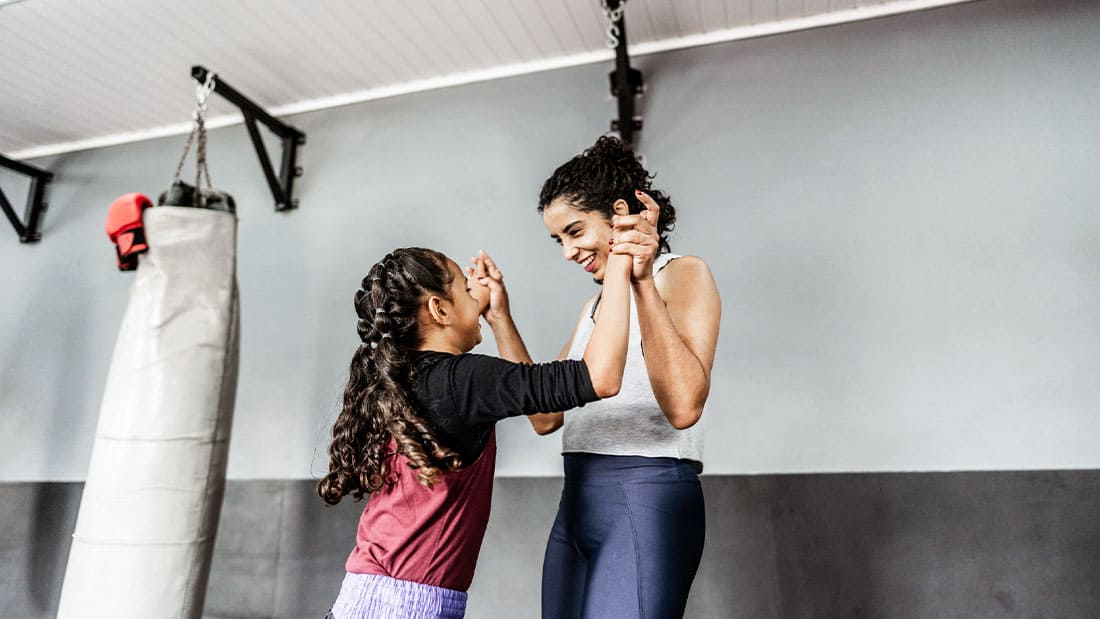3 All-Too-Common Mistakes Trainers Make on Social Media
Social media is powerful. It connects us with people we might never have the chance to converse with otherwise. It exposes us to new ideas. It allows us to feel like our voice matters.
But with great power, comes great responsibility. It can take years to build trust, but only a brief touch of a “post” button to lose it. In a strange way, social media is a representation of who you are to the world. Those who don’t know you or perhaps will never meet you get to know you through how you present yourself online.
Close your eyes. Sit back in your chair and ask yourself, how do you want to be viewed by the world? What do you see? What do you want people to say about you? Would your parents, grandparents or anyone who helped you become who you are today be proud of how you represent yourself?
With that in mind, let’s dive into three avoidable social media pitfalls I commonly see trainers/coaches fall into.
1. Not Wearing Clothes
Trainers, taking constant pictures of yourself or videoing yourself with minimal clothing on doesn’t send the message you might think it does. It does show you lack professionalism, communication skills, and in all probability, self-esteem. If you feel the need to get nearly naked on your social media feed, it’s more than likely because you have no actual content to show. No one cares about your 6-pack, your big arms, or your seemingly jacked back. If you’re in great shape, we can tell (yes, even with your clothes on). We want to see your clients training and progressing with your programming. We want to hear your thoughts on the latest hot topic in the field. We want to know how you think we can go about building better athletes/humans.
Taking off your clothes for no other reason than to get likes and attention may feel good in the moment, but in the long run, it loses you respect amongst your peers and makes you seem narcissistic. You must remember we exist in a field built to serve others, not ourselves. A photo showing off some gains every now and then? OK, fine. But when your feed is nothing but nearly naked photos, it doesn’t convey a good message.
2. Disrespectfully Disagreeing
If everyone in our industry agreed all the time, this field would be super boring and it would never move forward. Disagreement and healthy arguments are two things that help our industry grow and advance. Social media has made having these debates easier than ever, which is awesome.
However, you don’t get brownie points for showing someone up on social media. You don’t get a pat on the back, more clients or a sponsorship from Muscle Milk by belittling people. If you disagree with something someone has posted, by all means, state your opinion. But you don’t have be a jerk about it.
Respectful disagreement isn’t hard. It can just be something like: “Thanks for your feedback. This is why I feel this way (insert your opinion).“
Believe it or not, it is possible to present your own beliefs without tearing someone else down. The majority of great minds in this industry see eye-to-eye on 90% of things. Is it really worth it to lose potential collaborators and clients getting into vicious arguments over the remaining 10%?
If you find yourself getting into a long, drawn-out discussion with someone who is not being respectful, you can simply walk away from the conversation or block them. There’s usually nothing to gain and a lot to lose from prolonged interactions with people like that.
3. Too Much Irrelevant Content
If you don’t want your social media presence to be tied into your career, I get it. It’s likely going to make business tougher for you, but maintaining a constant presence can be exhausting. If you want to have an account just to have fun and stay up to date with your friends, then maybe don’t present it as a representation of your professional self. Or have two accounts—one personal, one more career-oriented.
But if you have an account you’re giving out to clients, putting on your career pages, and interacting with athletes/coaches/trainers from, it shouldn’t be filled with junk. Young trainers, I’ve been there and I get it. There is an awkward line between how you previously used social media and how you should be using it now. It used to be a place to share pictures, make jokes, and cut up with your friends. But if you want a strong social media presence in today’s industry and one that gets respect from your peers, then you have to treat it almost like a résumé. You wouldn’t turn in your résumé to a possible employer with poor language, misspellings, crud jokes and half-naked selfies, so why would you present yourself like this to the world every single day?
Some off-topic banter and random thoughts is totally fine, but if your account is totally devoid of substance relevant to your career, don’t present it as a professional representation of yourself. I am very fortunate to be able to interact with many athletes and trainers who have a vision of being great at what they do. They aspire to be the best in their field, but sometimes it’s hard to stay focused on the correct path to becoming that great figure. Part of becoming that person is how you present yourself on social media.
For those of you who want to be great and wish to one day become the person you idolize, before you make your next post, I’ll leave you with a thought. If you knew someone out there looked up to you, what would your next post do for that person?
Photo Credit: andresr/iStock
READ MORE:
RECOMMENDED FOR YOU
MOST POPULAR
3 All-Too-Common Mistakes Trainers Make on Social Media
Social media is powerful. It connects us with people we might never have the chance to converse with otherwise. It exposes us to new ideas. It allows us to feel like our voice matters.
But with great power, comes great responsibility. It can take years to build trust, but only a brief touch of a “post” button to lose it. In a strange way, social media is a representation of who you are to the world. Those who don’t know you or perhaps will never meet you get to know you through how you present yourself online.
Close your eyes. Sit back in your chair and ask yourself, how do you want to be viewed by the world? What do you see? What do you want people to say about you? Would your parents, grandparents or anyone who helped you become who you are today be proud of how you represent yourself?
With that in mind, let’s dive into three avoidable social media pitfalls I commonly see trainers/coaches fall into.
1. Not Wearing Clothes
Trainers, taking constant pictures of yourself or videoing yourself with minimal clothing on doesn’t send the message you might think it does. It does show you lack professionalism, communication skills, and in all probability, self-esteem. If you feel the need to get nearly naked on your social media feed, it’s more than likely because you have no actual content to show. No one cares about your 6-pack, your big arms, or your seemingly jacked back. If you’re in great shape, we can tell (yes, even with your clothes on). We want to see your clients training and progressing with your programming. We want to hear your thoughts on the latest hot topic in the field. We want to know how you think we can go about building better athletes/humans.
Taking off your clothes for no other reason than to get likes and attention may feel good in the moment, but in the long run, it loses you respect amongst your peers and makes you seem narcissistic. You must remember we exist in a field built to serve others, not ourselves. A photo showing off some gains every now and then? OK, fine. But when your feed is nothing but nearly naked photos, it doesn’t convey a good message.
2. Disrespectfully Disagreeing
If everyone in our industry agreed all the time, this field would be super boring and it would never move forward. Disagreement and healthy arguments are two things that help our industry grow and advance. Social media has made having these debates easier than ever, which is awesome.
However, you don’t get brownie points for showing someone up on social media. You don’t get a pat on the back, more clients or a sponsorship from Muscle Milk by belittling people. If you disagree with something someone has posted, by all means, state your opinion. But you don’t have be a jerk about it.
Respectful disagreement isn’t hard. It can just be something like: “Thanks for your feedback. This is why I feel this way (insert your opinion).“
Believe it or not, it is possible to present your own beliefs without tearing someone else down. The majority of great minds in this industry see eye-to-eye on 90% of things. Is it really worth it to lose potential collaborators and clients getting into vicious arguments over the remaining 10%?
If you find yourself getting into a long, drawn-out discussion with someone who is not being respectful, you can simply walk away from the conversation or block them. There’s usually nothing to gain and a lot to lose from prolonged interactions with people like that.
3. Too Much Irrelevant Content
If you don’t want your social media presence to be tied into your career, I get it. It’s likely going to make business tougher for you, but maintaining a constant presence can be exhausting. If you want to have an account just to have fun and stay up to date with your friends, then maybe don’t present it as a representation of your professional self. Or have two accounts—one personal, one more career-oriented.
But if you have an account you’re giving out to clients, putting on your career pages, and interacting with athletes/coaches/trainers from, it shouldn’t be filled with junk. Young trainers, I’ve been there and I get it. There is an awkward line between how you previously used social media and how you should be using it now. It used to be a place to share pictures, make jokes, and cut up with your friends. But if you want a strong social media presence in today’s industry and one that gets respect from your peers, then you have to treat it almost like a résumé. You wouldn’t turn in your résumé to a possible employer with poor language, misspellings, crud jokes and half-naked selfies, so why would you present yourself like this to the world every single day?
Some off-topic banter and random thoughts is totally fine, but if your account is totally devoid of substance relevant to your career, don’t present it as a professional representation of yourself. I am very fortunate to be able to interact with many athletes and trainers who have a vision of being great at what they do. They aspire to be the best in their field, but sometimes it’s hard to stay focused on the correct path to becoming that great figure. Part of becoming that person is how you present yourself on social media.
For those of you who want to be great and wish to one day become the person you idolize, before you make your next post, I’ll leave you with a thought. If you knew someone out there looked up to you, what would your next post do for that person?
Photo Credit: andresr/iStock
READ MORE:












